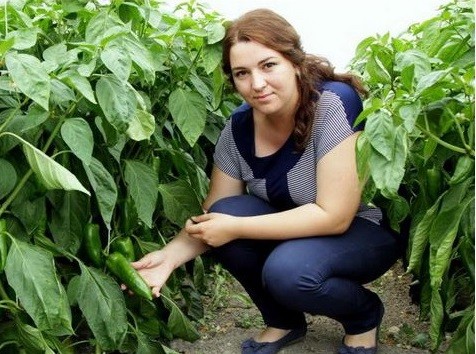Speeches Shim

February 2016—Around 50 percent of Serbia’s youth are unemployed, yet only a small number are considering starting their own businesses. A lack of knowledge, experience and resources are major reasons that young people choose not to become their own bosses.
Official statistics show that Serbian entrepreneurs are contributing less than 8 percent to the gross domestic product. To help young people learn how to be entrepreneurs, create employment in their communities, and ensure a livelihood for themselves, USAID launched the Youth Horticulture Incubator Program in 2013 in the Vojvodina province of northern Serbia.
The program is designed to reduce the time and cost of establishing youth farm startups and help small producers increase their profits by diversifying their agricultural products. A majority of farmers in the region concentrate on grains, which bring less revenue per hectare than vegetables.
Over 60 unemployed young people 15-35 years old and interested in working in agriculture were trained in farm management and cultivation of higher-value crops such as peppers, lettuce, tomatoes and cucumbers. The top trainees were offered land, infrastructure and two years of mentorship support to start their own agribusinesses in 31 greenhouses located in Novi Bečej, Kikinda and Zrenjanin.
“With the practical knowledge I gained in the incubator, and with the money I earn from the sales of my produce, I will be able to start and expand my own farm business once the program concludes,” said agroeconomy student Dragana Marčićev.
Only three months after the start of the program, 16 tenants completed the first greenhouse cultivation season, produced 20 tons of vegetables, and earned their first sales. A local farmers’ association that mentors the incubator tenants helped them to identify the most lucrative product with the highest market demand.
Some of the young farmers sold their tomatoes and peppers at the local market, while others exported cornichon cucumbers to a German food processing company specializing in gherkins. If greenhouse vegetable producers remain competitive and prove to be dependable suppliers, they could build a base of raw materials substantial enough to attract and maintain sales with additional food processing investors throughout the region.
Not only have the Serbian youth become entrepreneurs, establishing a future for themselves, but they are strengthening rural communities by developing economic opportunities in their hometowns.
The program is part of USAID’s Sustainable Local Development Project, which aims to reduce unemployment in 32 Serbian municipalities. The program runs from December 2010 to August 2016.
LINKS
Follow @USAIDSerbia, on Facebook, on YouTube

Comment
Make a general inquiry or suggest an improvement.